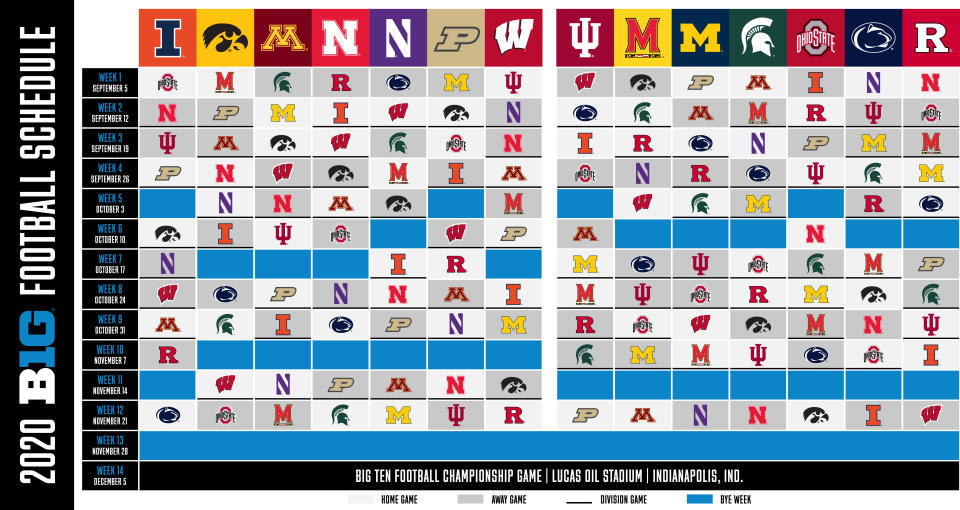Amid tenuous times, Big Ten reveals flexible 2020 football schedule
The name of the Big Ten’s new scheduling model is Jenga 41, a nickname born of the document name on its Excel spreadsheet. The allusion to the popular game that involves stacking wooden blocks is a fitting one.
The Big Ten officials nicknamed it that because it was designed to have flexibility to move the season around, much like a malleable structure. The Big Ten is now scheduled to be the first major conference to kick off the 2020 football season, as the league’s opening schedule is slated for Sept. 5. But both Week 1 and Week 2 could be moved back to one of the two open dates on the schedule, and Week 3 and Week 4 could be folded into bye dates.
Overall, 41 of the 70 games in the league’s conference-only schedule can collapse into one of the two existing bye weeks. Hence the name, Jenga 41. But the reality as the Big Ten lurches forward through these uncertain times is that the season itself could collapse.
“Issuing a schedule does not guarantee competition this fall will occur in the Big Ten conference,” commissioner Kevin Warren told Yahoo Sports in a phone interview. “We felt collectively that this was the next logical and methodical step forward in our process to be able to, at least, put some planning in place for our fall sports season.”
The Big Ten was the first conference to go to league-only matchups, as Warren has long made clear that his priority in pushing the league cautiously forward remains the health and safety of the student athletes.
The conference instituted the strictest testing protocols in major college sports, as athletes, coaches and staff in sports with a “high risk of contact” are required to take a minimum of two polymerase chain reaction (PCR) tests for the virus each week. Warren’s son, Powers, is a redshirt junior tight end at Mississippi State and he said one of the guiding lights of the plan was implementing a process he’d feel was safe for his own son.

The testing is going to be managed by a third-party laboratory to ensure consistency across the conference. The protocols also allow for the flexibility for more testing, which the league could face as technology changes and instant daily tests become available over the upcoming weeks and months.
The Big Ten announcement comes at a tenuous time for both the league and the sport, as coaches and administrators attempt to navigate a path to play football in 2020. Three Big Ten teams – Rutgers, Michigan State and Northwestern – are on pause from workouts because of COVID-19 outbreaks, with five overall having taken a pause at some point this summer.
Minnesota receiver Rashod Bateman declared on Tuesday he’s opting out for the NFL draft and Yahoo Sports’ Eric Edholm reported that Penn State linebacker Micah Parsons is expected to do the same. Their departures reflect the uncertainty of the season.
“This is a day-to-day journey together,” Warren said. “That’s the best way I can say it. I feel good today to proceed tomorrow. That’s how we’ll look at this. I have to evaluate every item on a daily basis.”
Warren, the Big Ten’s first-year commissioner, continued to speak in measured tones when addressing the fate of college sports in 2020. When the Big Ten announced it was going to a conference-only schedule on July 9, Warren declared to Yahoo Sports he was “very concerned” about the season.
He continued that pragmatism a day after an NJ.com report revealed that Rutgers had 28 positive cases.
“We remain hopeful to be able to start fall sports in September of 2020,” he said. “We cannot emphasize enough that the support of all of our student athletes is our top priority during these complicated and challenging times.”
The schedule itself has some interesting quirks. The annual marquee game between Michigan and Ohio State is scheduled to be in Columbus on Oct. 24, about a month before the typical end-of-season clash between the rivals. The Big Ten also didn’t frontload the schedule the same way that the Pac-12 did with games like USC vs. UCLA, a nod to the inevitability that some of the Week 1 games may end up having to be moved back.
Other marquee games include Minnesota hosting Michigan on Sept. 12, Iowa playing at Minnesota on Sept. 19, Penn State visiting Michigan State and Minnesota playing at Wisconsin on Sept. 26, and Penn State hosting Ohio State on Nov. 7.
“It was important for us to be nimble, agile and balanced,” Warren said. “Those are three critical words. One of the reasons we went to conference-only schedule is that it would allow us to have a flexible schedule and be able to make quick decisions in real time based on current medical advice and the fluid nature of bye weeks.”
More from Yahoo Sports:
